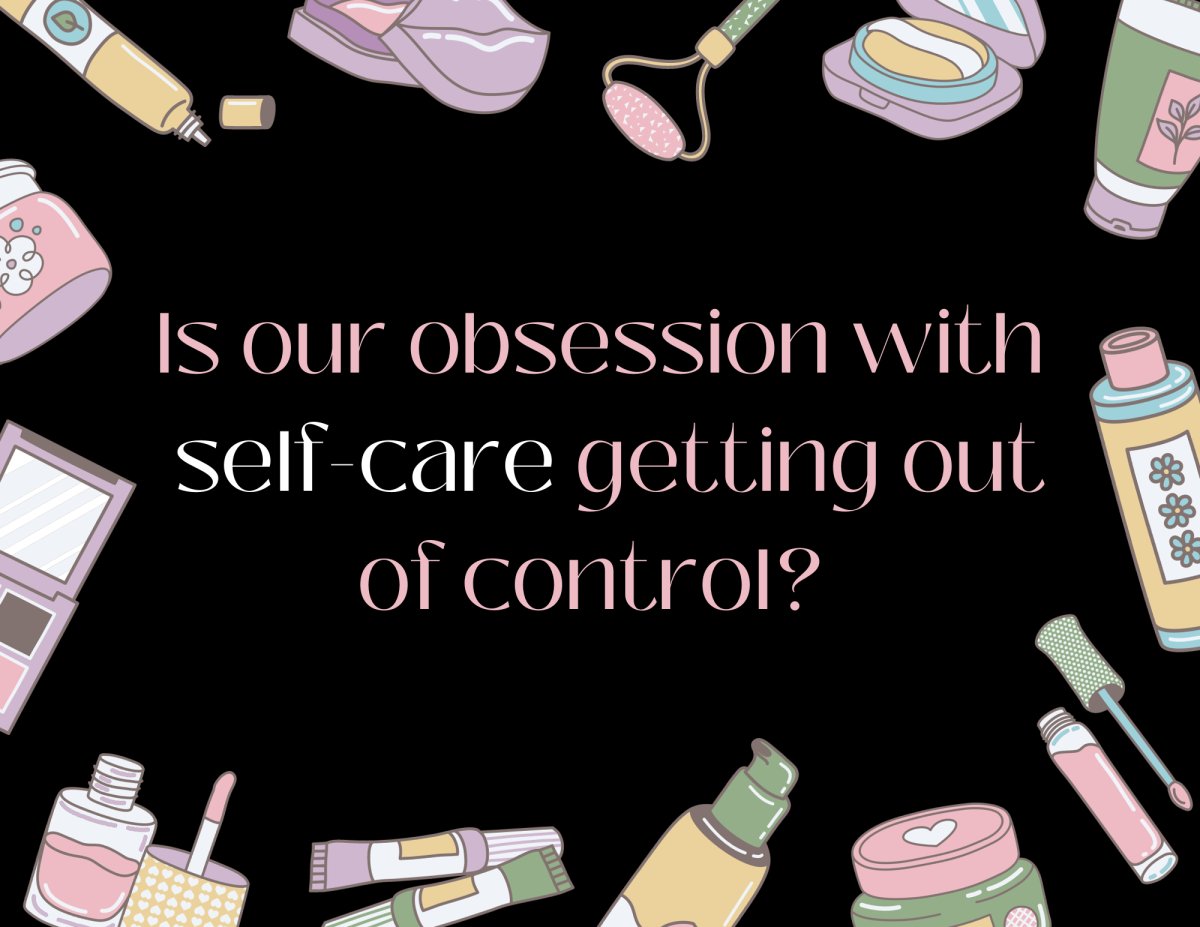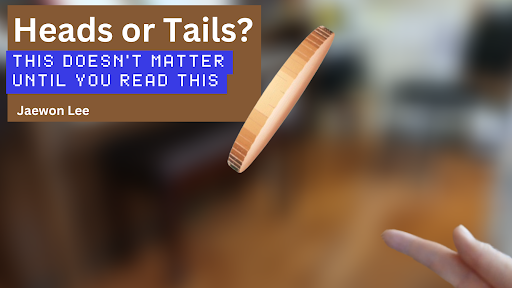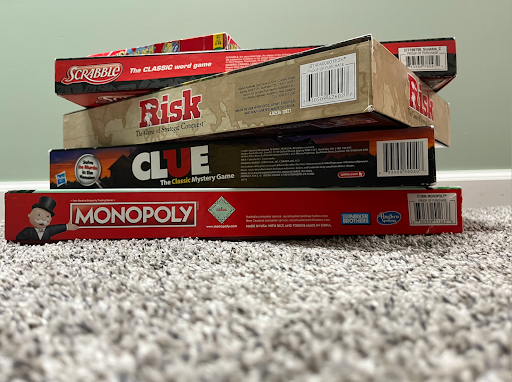It’s late and you’re tired. It’s been a painfully long day– so you hop online, maybe as a little pre-bedtime guilty pleasure. You search up the words “self-care.” And what you find is almost a whole other world– bath time completed with vanilla candles and peppermint bath salts, snail mucin and caviar serums, Korean face masks and shelves upon shelves of color-coded skincare products. So you decide to spoil yourself. You deserve a treat every now and then, right? Months later, your bathroom shelves are filled with serums, toners, bath soaps, pink crystal ice rollers, oil cleansers, and French moisturizers.
But months later, you come to realize that nothing has changed. Your life doesn’t look like the person who posted the video using all the products, your life is not filled with matcha lattes, pilates mornings or one-way tickets to Paris. In fact, your life is exactly the same. You aren’t any happier, you don’t get any joy from your 10-step skincare routine nor all the products lining your wall. You’re still tired, still burnt out. This is the problem: plain, blatant consumerism under the guise of “self-care.”
To understand why this is, we must first understand the history of the term itself. The term “self-care” has developed and changed with society and humankind, as many things do. Origins of the term trace back to the Ancient Greek philosopher Socrates, who first wrote and referred to the term. Then a millennia later, French philosopher Michel Foucault resurfaced the writings and the term in his work in the 1980s. However, “self-care” is mostly cited by Audre Lorde, a Black female poet, philosopher, professor, and civil rights activist, during the Civil Rights movement in the mid 1900s. Under Lorde’s guidance, self-care became a political statement, “Caring for myself is not self-indulgence, it is self-preservation and that is an act of political warfare,” Lorde writes in her 1988 essay collection.
In the 21st century, self-care has become almost completely synonymous with consumerism. According to the Global Wellness Institute, as of 2022, the wellness industry is worth $5.6 trillion dollars– figures that are only expected to rise. Among all 11 different industries falling into Wellness, the Personal Care & Beauty industry ranks the highest– being worth around $1,089 billion dollars.
The increase in this economy is due to multiple factors– rise in social media and the trust in influencers, the human need for control, and our fear of change.
As humans, we always need to feel in control. In an overwhelming and stressful world, buying a new product with pretty packaging can seem like an amazing solution, at least temporarily. To some, it can be a way of demonstrating to yourself that you’re responsible enough to make your own purchases. That you’re in control of your life.
The increase in the “self-care” economy, especially in beauty, also has to do with the overwhelming increase in social media and the influencer industry. The current generation now trusts social media influencers more than ever. Companies and advertisers are well aware of this– they put all of their money and investment in influencers instead, because they know that they will sell better than ads on National TV. “The notion of the [influencer] is that they’re doing it for love and not for money; they enjoy the creative expression, they have no ulterior motives. That has created the expectation in audiences that these folks are trustworthy, and that’s exactly what makes them valuable to then sell on behalf of marketers and corporations.” Said Michael Serazio, journalist and communications professor at Boston College in a Vox Article about de-influencing. Influencers are considerably more “authentic,” and people will easily trust someone that they can relate to in their daily lives.
Additionally, being unwilling to make healthy changes and the fear of change plays a big role. The truth is, barely anyone is willing to or even want to make an actual change to care for themselves– waking up earlier, eating more nutritious meals, working out, reading a few minutes before bed. That’s hard. No one wants to make an actual change, because it isn’t really “self-care,” at least not if you ask the Internet. Instead, purchasing “self-care” products is the answer the internet would give you, and it is indeed much easier.
Remarkably, studies show that feeding into the hyper-consumerist culture of “self-care” can do exactly the opposite. When a consumer buys a product and realizes that it isn’t as efficient as it “should” be, consumers can tend to blame themselves. “You might think, ‘I didn’t relax right or I didn’t spend enough time on it.’” Said Christine Whelan, a clinical professor of consumer science at the University of Wisconsin-Madison in a LA Times article.
The issue is that “self-care” causes people to look at the problems they face as “their fault,” because they are simply too weak– instead of questioning the rules and norms of our society that cause them to be burnt out, tired, and stressed. This includes overtime working hours, lack of sufficient healthcare and housing, as well as unrealistic beauty standards. Companies are telling you that everything will be fine, everything will be okay, simply if you buy their product. We are essentially looking to capitalism to fix issues caused by a capitalist society.
Don’t get me wrong, purchasing “self-care” products can offer happiness and relaxation, no doubt. After all, self-care is completely subjective. But it is important to remember that all these products and items are all just material. And eventually, all materialism will fade away and become obsolete.
So maybe self-care isn’t any of what the algorithm is marketing and pushing towards us on social media. But what is it really? And how can someone even find this “real” self-care, when the world is so stressful and busy?
Self-care changes with the person. What works for one person may not work for the next. But really, wellness and self-care is simple. Caring for yourself can take the form of small things– going on a walk once a week, taking time to journal or even picking up the guitar that’s been sitting in your basement. Social engagement can also act as a great way of caring for oneself– reaching out to friends and family and simply spending time with your loved ones can be a great way to relax and decrease stress. By doing so, we can make self-care culture more than just materialism and an aesthetic with a hefty price tag.
https://www.vox.com/culture/23950580/deinfluencing-tiktok-shop-influencer-culture-consumerism
https://www.latimes.com/lifestyle/story/2022-10-18/self-care-needs-to-change
https://www.refinery29.com/en-us/2021/05/10493153/reclaiming-self-care-audre-lorde-black-women-community-care
https://statenews.com/article/2022/03/when-self-care-creates-careless-consumerism








